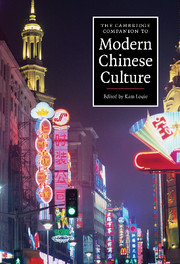Book contents
- Frontmatter
- 1 Defining modern Chinese culture
- 2 Social and political developments: the making of the twentieth-century Chinese state
- 3 Historical consciousness and national identity
- 4 Gender in modern Chinese culture
- 5 Ethnicity and Chinese identity: ethnographic insight and political positioning
- 6 Flag, flame and embers: diaspora cultures
- 7 Modernizing Confucianism and ‘new Confucianism’
- 8 Socialism in China: a historical overview
- 9 Chinese religious traditions from 1900-2005: an overview
- 10 Languages in a modernizing China
- 11 The revolutionary tradition in modern Chinese literature
- 12 The involutionary tradition in modern Chinese literature
- 13 Music and performing arts: tradition, reform and political and social relevance
- 14 Revolutions in vision: Chinese art and the experience of modernity
- 15 Cinema: from foreign import to global brand
- 16 Media boom and cyber culture: television and the Internet in China
- 17 Physical culture, sports and the Olympics
- Appendix
- Index
5 - Ethnicity and Chinese identity: ethnographic insight and political positioning
Published online by Cambridge University Press: 28 May 2009
- Frontmatter
- 1 Defining modern Chinese culture
- 2 Social and political developments: the making of the twentieth-century Chinese state
- 3 Historical consciousness and national identity
- 4 Gender in modern Chinese culture
- 5 Ethnicity and Chinese identity: ethnographic insight and political positioning
- 6 Flag, flame and embers: diaspora cultures
- 7 Modernizing Confucianism and ‘new Confucianism’
- 8 Socialism in China: a historical overview
- 9 Chinese religious traditions from 1900-2005: an overview
- 10 Languages in a modernizing China
- 11 The revolutionary tradition in modern Chinese literature
- 12 The involutionary tradition in modern Chinese literature
- 13 Music and performing arts: tradition, reform and political and social relevance
- 14 Revolutions in vision: Chinese art and the experience of modernity
- 15 Cinema: from foreign import to global brand
- 16 Media boom and cyber culture: television and the Internet in China
- 17 Physical culture, sports and the Olympics
- Appendix
- Index
Summary
Ethnic identity is never static; nor is it a consistent social category. This very fluidity accounts for the presence of competing postures within a community. The internal conflict between individuals as private selves and as members of groups can result in the expansion, however momentary, of group affiliation and consciousness. Left unchecked, the assertion of group identities, especially ethnic identities, can tear a nation-state apart. In contemporary China, the central government actively promotes the nation-state as the primary source of emotional transference and personal identification. In making the nation the paramount reality the state hopes to subsume alternative, potentially competing forms of identity under the umbrella of nationalism. The Chinese state has demonstrated a willingness to use severe negative sanctions on those who challenge its authority in an effort to buttress national unity at the expense of ethnic identity. The origins, meanings and expressions of Chinese ethnicity are intertwined with the central government's ethnic policies that, in so many ways, are in conflict with ethnic identity. The dichotomy arises from pursuing cultural models that are anchored in the contradictory principles of multi-culturalism and mono-culturalism. These competing ideals are constantly demonstrated in the state's policies toward ethnic minorities in China. Striving to uphold these two ideals results in the promotion of certain policies that support an ethnic minority's interests while at the same time implementing policies that undermine minority cultural values. This chapter will examine each of these models in turn.
- Type
- Chapter
- Information
- The Cambridge Companion to Modern Chinese Culture , pp. 91 - 114Publisher: Cambridge University PressPrint publication year: 2008
- 4
- Cited by

